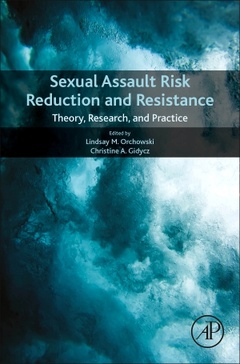Sexual Assault Risk Reduction and Resistance Theory, Research, and Practice
Coordonnateurs : Orchowski Lindsay M., Gidycz Christine

Sexual Assault Risk Reduction and Resistance explores the theory, research, and practice of sexual assault risk reduction, resistance education, and self-defense programs for women and other vulnerable groups, including sexual minorities, individuals with disabilities, and those with histories of victimization. Following an ecosystemic perspective, the book examines individual risk and protective factors for sexual victimization, as well as peer-, family-, community- and societal-level factors that influence risk for sexual violence and inform the content of programs.
This volume brings together leading researchers and practitioners to operationalize sexual assault risk reduction approaches and highlights the rationale and need for risk reduction in the context of other sexual assault prevention efforts. The volume provides an overview of the history of this sexual assault prevention approach and addresses current controversies and questions in the field. The authors outline risk and protective factors for victimization and discuss how these factors guide risk reduction efforts. The volume also outlines the theory and effectiveness of current sexual assault risk reduction and resistance practices and addresses special populations and future directions.
1. Introduction 2. The Current State of Sexual Assault Risk Reduction 3. The Consequences of Rape: Ensuring that Interventions are Trauma Informed
PART 2: Risk and Protective Factors 4. Risk for Rape Across the Ecosystem: Outlining a Framework for Sexual Assault Risk Reduction and Resistance Education 5. Perpetrator Characteristics: Implications for Risk Reduction Programming, Policy and Sanctioning on College Campuses 6. “I thought it could never happen to me: Understanding Women’s Perceptions of Risk for Violence 7. Psychological Barriers to Resistance 8. Fighting Back! Efficacy of Women’s Resistance Strategies to Rape 9. Alcohol Use and Risk for Sexual Violence
PART 3: Intervention Approaches and Efficacy 10. Approaches to Sexual Assault Risk Reduction, Resistance, and Self Defense 11. Efficacy of Sexual Assault Risk Reduction and Resistance Education Programs 12. Efficacy of Self Defense Training for Rape Resistance 13. Sexual Violence as a Global Health Problem: Theory and Intervention Efficacy
PART 4: Special Populations and Topics 14. Reducing Risk for Revictimization: Rationale and Intervention Approaches 15. Risk Reduction among LGBTQ Populations 16. Intersection of Sexual Assault Risk Reduction and HIV Prevention 17. Preventing the “Second Assault: Strategies for Enhancing Social Reactions to Disclosure of Sexual Victimization
Christine Gidycz is a developer and evaluator of the Ohio University Sexual Assault Risk Reduction Program. This program has sustained development, evaluation and revision across 7 outcome studies over the past 20 years. Dr. Gidycz has received funding from the Ohio Department of Health as well as the Centers for Disease Control. She is the author of numerous manuscripts addressed sexual assault risk reduction, sexual assault prevention, and risk factors for violence
- Reviews theoretical approaches to sexual assault risk reduction
- Summarizes program outcome studies
- Delineates feminist self-defense approaches
- Details what it means for prevention to be "trauma informed"
- Considers how to provide risk reduction without victim-blaming
- Confronts current controversies in the field of sexual assault risk reduction
- Details how prevention can address the role of alcohol in sexual violence
- Discusses international prevention efforts
Date de parution : 06-2018
Ouvrage de 470 p.
15x22.8 cm
Thème de Sexual Assault Risk Reduction and Resistance :
Mots-clés :
acknowledge; act (AAA); Act program; Alcohol; Alcohol-related sexual assault; Assertive forms; Assertiveness; Assess; Atheoretical; Behavioral responding; Best practices in prevention; Betrayal trauma theory; CDC framework; Centers for Disease Control and Prevention; Childhood abuse; Childhood and adulthood; CSA; Disability-related factors; Disparities; Emerging adulthood; Enhanced assess; Environmental interventions; ESD curriculum; Forceful verbal; Gender minority; Global prevalence; Historical grounding; Hostility and aggression; Ideologies; Incapacitated rape; Intervention approaches; Intimate violence; LGBT; Mental preparedness; Minority stress; Native Americans; Neurocognitive; Optimistic bias; Organizational-related factors; Physical disabilities; Posttraumatic stress disorder (PTSD); Prevention; Protective factors; Psychoeducational; Psychological barriers; Psychotherapy; PTSD symptom; Rape; Relationship expectancies; Replication; Reproductive coercion; Research evidence; Resistance education programs; Revictimization; Risk recognition; Risky sexual behavior; SAMFE; SBIRT; Self-defense; Self-defense programs; Self-defense training; Sexual abuse; Sexual aggression; Sexual assault; Sexual assault prevention; Sexual assault resistance; Sexual assault risk reduction; Sexual assault risk reduction (SARR); Sexual attitudes; Sexual coercion; Sexual experiences survey; Sexual harassment; Sexual health; Sexual minority; Sexual victimization; Sexual violence; Sexually transmitted infections; STI/HIV transmission; Trauma-informed framework; Traumas; Unwanted pregnancy; Verbal pressure; Victim relationship; Victim support; Victim-blaming; Victimization; Women's sexual risk



